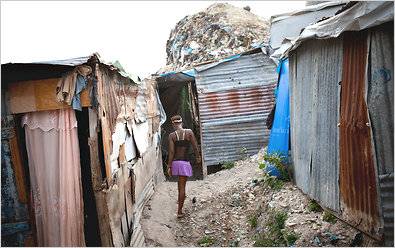In places such as Croix-des-Missions, on the northeastern edge of the Haitian capital, the walls of dozens of homes along a pale brown river have been broken or ripped away, exposing clothes, bedding and everything else to the repeated downpours. Heavy rains began falling in southern Haiti even before Hurricane Sandy passed just west of the country's southern peninsula the night of Oct. 24, dropping more than 20 inches of rain within a 24-hour period. "It took away my whole home. Now I don't have anything," said Solange Calixte, a 56-year-old mother of two whose home in Croix-des-Missions was largely destroyed by floodwaters of the nearby Gray River.
One of 21,000 people the U.N. says were left homeless by Sandy, Calixte was forced to move with her belongings beneath a tarp at a neighbor's home. And the rains have kept coming. Another front soaked much of the north late last week, causing more flooding and leaving at least a dozen dead. So far the back-to-back storms have killed up to 66 people and the crisis is likely to worsen in coming months. Humanitarian workers anticipate a food shortage brought on by the massive flooding that destroyed yam and corn fields.
The United Nations says that as much as 90 percent of Haiti's current harvest season, much of it in the south, was lost in Sandy's floods, and the next harvest season won't begin until March. The World Food Program estimates that more than 1.5 million people are now at risk of malnutrition because they were either displaced or lost crops, forcing Haitians to rely heavily on more-expensive imports. "This means massive inflation, hunger for a lot of people and acute malnutrition," said Johan Peleman, head of the U.N. Office for the Coordination of Humanitarian Affairs in Haiti. "Basically, the cushion is gone."
Soaring food costs have rattled Haiti before. In 2008 a jump in prices sparked more than a week of deadly rioting and ended in the ouster of the prime minister and his Cabinet. The U.N. and Haitian government are now launching an emergency appeal to raise $39 million in hopes of stemming what they foresee as Haiti's next humanitarian crisis. This money is supposed to help 1.2 million people by providing shelter and food, repairing water, sanitation systems and schools.
MORE

